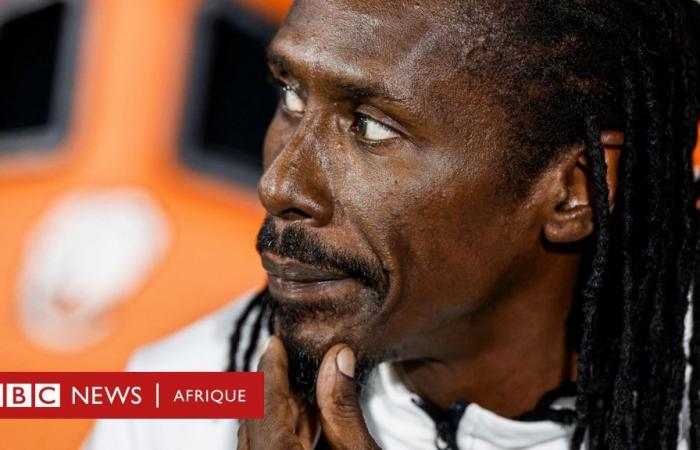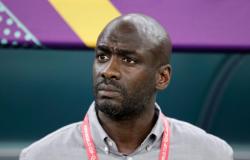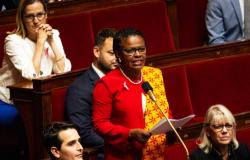
Photo credit, Getty Images
- Author, Piers Edwards
- Role, Football specialist editor
-
28 minutes ago
The president of the Senegalese Football Federation (FSF) said he was “very sad” to see coach Aliou Cissé, winner of the African Cup of Nations, leave his post last month, following a directive of the country’s Ministry of Sports.
Cissé, who led the West African country to the first ever Nations Cup (CAN) title in February 2022, was fired after nearly a decade in charge of the team . The FSF did not agree with this decision by the Ministry of Sports which pays the salary of the national coach.
During his tenure, Senegal were also finalists at CAN 2019 and participated in two Fifa World Cups. Since the start of last year, the 48-year-old technician has not lost a competitive match, except on penalties.
“Before his arrival, we had never won a continental trophy,” Augustin Senghor, president of the FSF, told BBC Sport Africa.
“It was huge for us. That’s why I think it was good to let him finish his work, because Senegal is in a transition phase. »
“He left following a government decision. We respect it because we respect authority.”
Although Cissé’s contract expired in August, he remained on duty for the first Africa qualifying matches in September, collecting four points from two matches, and expected to receive a 12-month extension to his contract .
“He was surprised, but the message he gave was that he didn’t want to create a crisis,” Senghor said.
“He is very attached to his country. He said: ‘President, I will support Senegalese football, because I am a son of this country’.
Oversee change
Senghor had wanted Cissé to complete the Africa qualifying campaign, the shortest in a decade, with all six matches completed in the space of three months.
“The generation of Sadio Mané, Idrissa Gana Gueye, Kalidou Koulibaly and others has perhaps one or two years to play, and perhaps still a World Cup,” said Senghor.
“After that we have the new generation – Lamine Camara, Pape Matar Sarr, Habib Diarra and all the players who have been part of our youth teams. »
“We have been working on this for a long time and Aliou has been one of the key men in this plan. »
“We believe it would have been better if he had stayed one more year to finalize the transition and leave with honor.”
However, Senghor believes that Cissé is young enough to take over the position in the future.
Avoid conflict
Photo credit, Getty Images
Cissé’s long tenure – a rarity on the continent – coincided with Senegal’s most sustained period of success, which spent four years at the top of the African rankings.
Prior to his appointment in March 2015, the national team had reached one CAN final and one World Cup, both of which came in 2002, when Cissé was team captain.
The Teranga Lions began to conquer the continent at the under-20 and under-17 level, as well as at the African Nations Championship (CHAN).
The ax did not take long to fall: Cissé was dismissed from his duties just two days before the announcement of the team’s composition.
A statement from the FSF said they had failed to achieve their goals of winning this year’s AFCON and reaching the quarter-finals of the 2022 World Cup (where they lost to England in the round of 16). final), slipping in the world rankings (Senegal is 20th, three places below its record) and, crucially, “the risk of disaffection between our national team and the Senegalese in general”.
Criticism of Mr. Cisse’s tactics grew after the national team was eliminated in 2023, prompting the ministry to take steps that many see as a populist act.
“The government’s agenda is not the same as that of football,” Mr. Senghor said.
“They decided and, unfortunately, we could not oppose it. If we want to continue, we must do so within a framework of stability.”
Senghor added that the conflict between the FSF and the government was “not fruitful”.
Senegal’s new coach expected before March
Photo credit, Getty Images
Pape Thiaw, Cissé’s former assistant and coach who led Senegal to victory at CHAN last year, has completed the 2025 Africa qualifying campaign.
“We said, ‘We’ll do Aliou without Aliou – he’s not here, but he’s there. Every time you are on the bench, think that Aliou is with you,” Senghor explained.
Two victories against Malawi ensured qualification from Group L with two days remaining.
There are four months until the next international break in March, when Senegal will resume their efforts to qualify for the 2026 World Cup.
“We have three or four months to go slowly, intelligently and make the right choice,” said Senghor, who hopes to appoint a new coach before these matches.
Objective: progress in the World Cup
It is likely that the FSF will look internally, continuing a vision that Senghor has instilled since his arrival at the helm of the organization in 2009.
“Today, all our coaches are from our country and we have no reason to change,” he said.
“When you want to build something in your country, you must first start by developing the coaches and their skills. »
“It works. Now is not the time to change our philosophy.”
Whoever is lucky will have to set ambitious goals.
They will hope to not only surpass their historic World Cup quarter-final appearance in 2002, but also Morocco’s run at Qatar 2022, when the Atlas Lions became the first African team to reach the semi-finals.
“Qualifying for the Nations Cup is no longer an event for us,” Senghor said.
“Our goal is to go to the World Cup every four years and progress there, or even go further than Morocco, until the final.
” Why not ? We have the potential.





